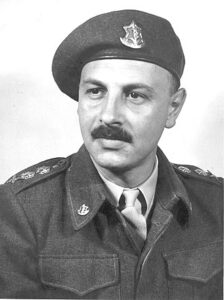
Yigael Yadin (March 20, 1917 – June 28, 1984) was born as Yigael Sukenik in Ottoman Palestine to archaeologist Eleazar Sukenik and his wife Hasya Feinsod. At age 15 he joined the Haganah, serving in a variety of different capacities, rising to Head of Operations during Israel’s 1948 War of Independence. He was alleged to have overseen a biological warfare operation during that war, poisoning wells in Palestinian villages to prevent the return of the villagers. In 1949, he was appointed as the second chief of staff of the Israel Defense Forces, resigning at the end of 1952 in a dispute with Prime Minister David Ben-Gurion, who had cut the military budget.
Thereafter, Yadin devoted himself to archaeology, winning the 1956 Israel Prize for his doctoral thesis on seven Dead Sea Scrolls, three of which his father had purchased in 1947 from a Bedouin goatherd and four that Yadin purchased in 1954 in New York. He excavated such sites as the Qumram Caves, Masada, Hazor, Tel Megiddo, and the Judean Desert caves where artifacts from the Bar Kokhba revolt were found.
His military expertise remained respected, and on the eve of the 1967 Six-Day War, Prime Minister Levi Eshkol brought him in as a military adviser. Following the 1973 Yom Kippur War, he served on a commission studying what had led up to it.
Yadin headed the Dash party in the 1977 elections, winning 15 Knesset seats. Prime Minister Menachem Begin subsequently appointed him as a deputy prime minister. He played a role in the Camp David Accords. He retired from politics in 1981.
With his wife Carmela Ruppin, he had two daughters, Orly and Littal. He was buried in the military cemetery on Mount Herzl in Jerusalem.
Tomorrow, March 21: Broncho Billy Anderson
*
SDJW condensation of a Wikipedia article